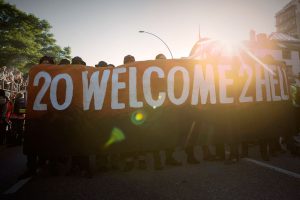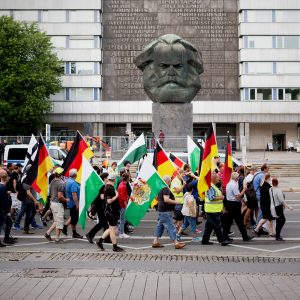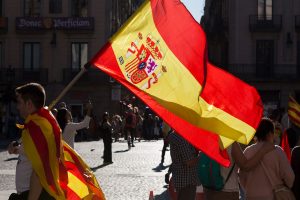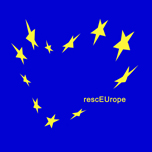
October 28th, 2019, 15:57 Uhr
This Crazy Brexit
This reportage takes me from the special summit in Brussels
to London. Here the British Parliament on Oct 19th 2019
is supposed to vote on the deal, while at the same time
one million people on the street rally against the Brexit.
If 10 Downing Street on “Super Saturday” was a photo booth at the fairground, then Boris Johnson, owner and first juggler among the quacks of Brexit, would earn himself a Golden Nose that day. Everyone who comes by now wants to have a selfie in front of the most famous show booth in the country.
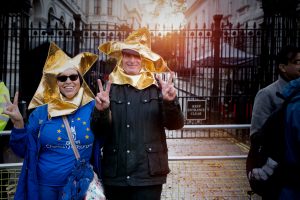 Johnson himself is not present. The magical negotiator, who would have liked to have conjured away the backstop, is selling his deal with the European Council just half a mile south of Parliament. He had agreed on the draft two days earlier in Brussels with the other 27 heads of state. He now lets 628 delegated tigers hop through a ring of fire. 322 refuse and thus again the exit fails. Déja vu, Mrs May?
Johnson himself is not present. The magical negotiator, who would have liked to have conjured away the backstop, is selling his deal with the European Council just half a mile south of Parliament. He had agreed on the draft two days earlier in Brussels with the other 27 heads of state. He now lets 628 delegated tigers hop through a ring of fire. 322 refuse and thus again the exit fails. Déja vu, Mrs May?
Meanwhile, masses of people gather outside for the People’s Vote March to express their displeasure with their prime minister’s exit fantasies and dip London’s streets in European blue with yellow dots. Shortly before the vote begins at the Westminster Palace, the seat of the British House of Commons, on whether MPs agree to the draft treaty from Brussels, the pro-European march arrives in Parliament’s front yard. A rally is now planned in Parliament Square.
During the 90 minutes from Speakers Corner to Parliament Square, thousands more Brexit opponents join the demo. They now talk about a million. The minutes of the vote in the House of Commons will be broadcast live on a huge screen above the stage behind Parliament: “The ayes to the right 322, the noes to the left 306. The ayes have it”, booms John Bercow, spokesman for the British House of Commons and the one who in February 2017 denied racist and sexist Donald Trump to address to the House of Commons. The masses are cheering.
What happened? Oliver Letwin, MEP, Tory rebel and self-confessed Brexit opponent, introduced an amendment into the debate on Johnson’s Brussels treaty saying that Parliament must first approve a ratification law before MPs can decide on the Brexit deal. It regulates the technical implementation of Brexit. This proposal was approved by 322 Members, with the following consequences: The routines that will apply to formulate and vote on the technical requirements for the Brexit will last longer than 31 October, which is now the third official date for the Brits to resign. In this case of unpunctuality, the Benn Act stipulates that Boris Johnson must ask Brussels for more time for the exit. He doesn’t want that at all and in his own words prefers to “lie dead in the ditch”. The crashing defeats of the last few weeks, which accompanied the Johnson government and party, make clear how deeply the distrust of the MPs towards the prime minister sits. He repeatedly and loudly expressed his preference for a hard Brexit.
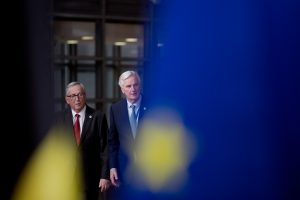 After the dismissals of the 21 rebels from the Tory faction at the beginning of September, who no longer wanted to follow the government in its Brexit course, Johnson had lost his already superthin majority of one vote in parliament. Among the 21 were Saturday’s petitioner Oliver Letwin and Winston Churchill’s grandson Nicholas Soames. Also Jo Johnson, the prime minister’s brother and a short-term speaker at the People’s Vote rally, resigned in this year`s September as a member of the cabinet because he was “torn between family loyalty and the national interest.”
After the dismissals of the 21 rebels from the Tory faction at the beginning of September, who no longer wanted to follow the government in its Brexit course, Johnson had lost his already superthin majority of one vote in parliament. Among the 21 were Saturday’s petitioner Oliver Letwin and Winston Churchill’s grandson Nicholas Soames. Also Jo Johnson, the prime minister’s brother and a short-term speaker at the People’s Vote rally, resigned in this year`s September as a member of the cabinet because he was “torn between family loyalty and the national interest.”
Boris Johnson’s idea that Brexit was a piece of cake proved to be wrong. He seems to be getting thinner-skinned. Or more annoyed. When on Thursday at the EU summit on Brexit in Brussels around 2 p.m. all press people greet head of state after head of state with a nervous finger on the trigger, only one is missing in the end. Boris Johnson comes through the back door. It would actually have been his appearance as a clever negotiator who finally negotiated a solution for the problematic backstop with the remaining 27 EU member states. However, the more difficult step of convincing his own parliament would follow.
Was Boris Johnson excited when he disappeared to London with Dominic Cummings, the Steve Bannon of Brexit, to discuss further strategy? After his disappearance, he left the European Quarter in Brussels behind as a high-security zone, but there is not a bit of excitement here. On the contrary, pubs and pints have opened regularly. After sunset they get crowded, the guests are standing in clusters on the streets in front of them. There is a lot of Spanish to hear, French and English of course.
Jean-Claude Juncker is after countless Brexit summits over the past three years completely unexcited. Instead, you can see the fatigue in his face on this Thursday. German Chancellor Angela Merkel is also cautiously optimistic when she thanks the EU’s chief negotiator on Brexit issues, Michel Barnier, for his work and states that the 27 remaining EU states would approve the withdrawal agreement with England.
But the long shadow of the Brexit hits the nerve of those who will have to endure it in the end and cope with the consequences. On the Saturday after the Brussels summit, at the People’s Vote March in London, they express their concern about Britain’s future. This October 19th is also the day on which Boris Johnson once again has to ask Brussels to postpone the date of departure in case the British House of Commons does not accept the drafts of the negotiations of the special summit of Thursday. The ayes have it, Johnson must ask!
 Hundreds of thousands now gather a few metres behind the House of Commons. They’ve come to London from all over the UK, from all districts and counties, and they’re not here for sightseeing – although they could have ticked that passing by. The three-miles route started at Speaker’s Corner at the north-east end of Hyde Park passed Trafalgar Square and Marble Arch until House of Parliament. No, on this day they are here to claim “Final Say” in the Brexit debate in the name of democracy. They all agree that they feel lied to and betrayed by the supporters of Brexit, first and foremost by Boris Johnson.
Hundreds of thousands now gather a few metres behind the House of Commons. They’ve come to London from all over the UK, from all districts and counties, and they’re not here for sightseeing – although they could have ticked that passing by. The three-miles route started at Speaker’s Corner at the north-east end of Hyde Park passed Trafalgar Square and Marble Arch until House of Parliament. No, on this day they are here to claim “Final Say” in the Brexit debate in the name of democracy. They all agree that they feel lied to and betrayed by the supporters of Brexit, first and foremost by Boris Johnson.
The unanimity of the million before Parliament stands in stark contrast to the disunity in Parliament, where, for the first time since 1982, there has been a Saturday debate. The call for a second referendum, now that all the cards are on the table, is strongly supported by prominent advocates at the rally. Star Trek legend Sir Patrick Stewart encourages the retainers by confidently describing: “We haven’t just impacted the Brexit debate, we’ve transformed British politics.”
In fact, as Jason Arthur, co-founder of “For Our Future`s Sake” (FFS), says, the People’s Vote movement has emerged from a variety of grassroots movements such as the student FFS in the face of the threat of disorderly Brexit. With the clear demand for more participation of the population in any form of Brexit, People’s Vote generated more and more supporters.
London’s mayor Sadiq Khan encourages the protesters by assuring them that “this is what democracy looks like” and that all neighbours and colleagues should feel welcome in the UK as Europeans. Khan also emphasizes that Brexit is not a philosophy, but an ideology! In the sense of Marx and Engels, ideologies do not follow plausibility and good arguments, but only serve to stabilize or change power relations. This is the approach taken by Diane Abbott, a British Labour politician and first Black woman in the British Parliament in 1987, who says she came “from defeating Boris and his terrible deal. We will do what it takes to keep defeating him.”
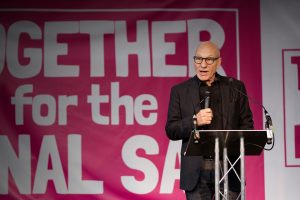 For now that has worked out well! In the meantime, Boris Johnson has sent a (unsigned) letter to the EU asking them to postpone leaving the EU. The Federal Chancellor and her French counterpart, Emmanuel Macron, have signalled to agree.
For now that has worked out well! In the meantime, Boris Johnson has sent a (unsigned) letter to the EU asking them to postpone leaving the EU. The Federal Chancellor and her French counterpart, Emmanuel Macron, have signalled to agree.
One would like to wish the top politicians the same cheerfulness, the same positive, progressive and decisive energy in the further negotiations as the protesters of Brexit did in London. How else can the constant summitting be endured if not with confidence and positive expectation?
More likely, however, is that a joyful expectation is directed towards the now beloved presidential buddies and on the joint evening programme after unpleasant negotiations, when they meet for a cultivated pillow fight in Macron`s room. Or at Boris` place because he always knows the latest magical tricks.



